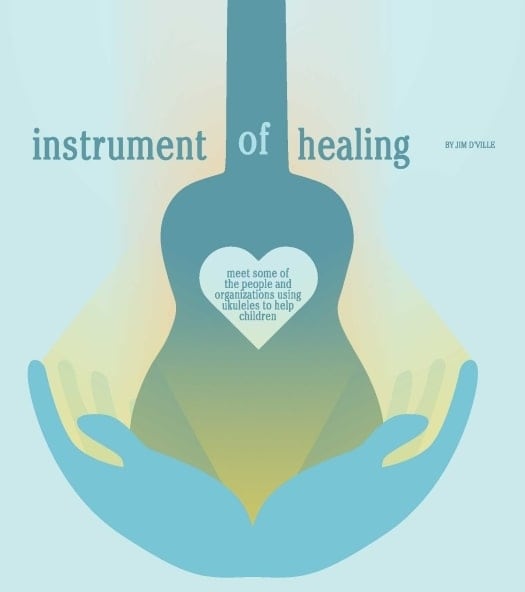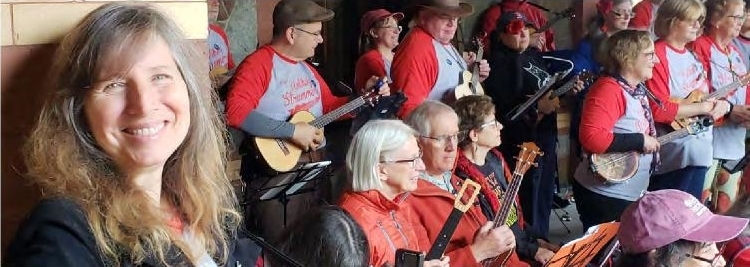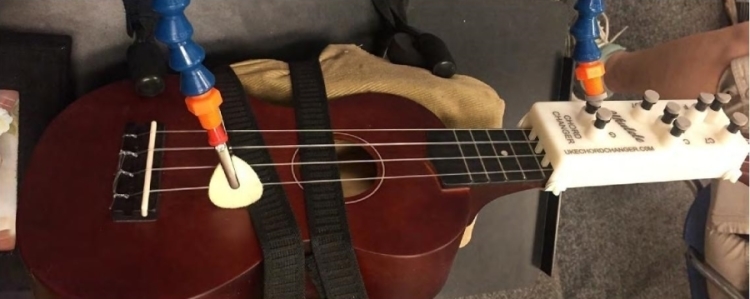Instrument Of Healing
UkuleleMag.com | Winter 2019
Meet some of the people and organizations using ukuleles to help children
A mounting body of scientific studies show the physical and mental benefits of playing music. The ukulele is, of course, a musical instrument, but it can also be used as an instrument of healing. One organization that is proving the healing powers of the ukulele and making a huge difference in the lives of countless children is the Ukulele Kids Club. What began as a search for solace after a tragic death has led to an overflowing of joy in hospitals worldwide.
The UKC was founded in January of 2014 by Corey and Edda Bergman not long after the unexpected loss of their 20-year-old son Jared due to a viral infection. To help assuage his pain, Corey first volunteered with the Make-A-Wish Foundation, and after a move from New York to south Florida, began volunteering at a children’s hospital.
A lifelong guitar player, Corey would bring his instrument with him during his hospital visits and play for the patients and their parents. One young patient told Corey that he, too, was a guitar player. Corey handed the bedridden boy his guitar, but its size made playing the instrument impossible through the maze of tubes and wires to which the boy was attached. A travel guitar could solve the size problem, maybe, but the size of the ukulele proved to be the perfect fit.
That fateful encounter put Corey on a mission to provide free ukuleles to hospitalized children. Stephanie Epstein, a board-certified Music Therapist at Holtz Children’s Hospital at Jackson Memorial in Miami, Florida, is the President of the UKC. “I met Corey about five years ago when I was starting my music therapy program at Holtz. I had heard about the Ukulele Kids Club from other music therapists. So, I reached out to see if I could start getting donations.” Corey hand-delivered the first donation of five ukuleles to Holtz which, in turn, led to working directly with Stephanie. “I kind of became Corey’s go-to for information concerning music therapy, and our professional relationship from there just blossomed.” Stephanie went on to become Director of Music Therapy for UKC and currently holds the position of President.
Since that first thought of using ukuleles to enhance the lives of sick children, Corey’s brainchild has spread to 237 hospitals world-wide. To date, the UKC has donated over 8,000 ukuleles to hospitals in the USA, Canada, Mexico, Japan, United Kingdom, France, Taiwan, Dominican Republic, and Puerto Rico. Stuart Butterworth, co-founder of the Ukulele Festival of Scotland, explains why their event chose to support UKC. “We were looking for a charity partner and had seen UKC posts regarding its work in the USA and the beginnings of its work in the UK. We thought their work was inspirational and no other UK fest or group had an obvious connection with them.”
While most hospital corridors are as quiet as a cotton ball, the wards where the ukulele has an established presence are alive with music. Dr. G. Patricia Cantwell of Holtz Children’s Hospital says, “There is no greater joy as a physician than to witness the smiles of very ill children mastering the ukulele or other instruments. Music therapy allows children and adolescents to seize control over one small aspect of their life and have fun while doing it. Music provides solace and hope to our patients and families as well as medical team members.”
The Ukulele Kids Club recently launched a new initiative called The UKC Rock Star Program. The Rock Star Program is designed for contributing donors to sponsor a specific hospital, often in their local area. Epstein explains, “Let’s say someone wants to donate to a certain hospital. They are named the Rock Star for that hospital for one year. When the music therapist gets low on instruments, they simply contact the Rock Star and they can fill the need.”
For a hospital to qualify for a donation from UKC they must have a board-certified music therapist on staff. According to Epstein, “We don’t just send the ukuleles to random hospitals to give them to the kids as gifts. What the Ukulele Kids Club is really about is utilizing the ukulele through music therapy to create that therapeutic and lasting change.”
Perhaps the most amazing aspect of the Ukulele Kids Club is how in a mere five-and-a-half years the program has grown to the point where the children who first benefited from the UKC are now giving back. Stephanie Epstein says, “We have patients who bring their ukuleles back to the hospital and give concerts in the hallways to the staff and other patients. Some bring their ukuleles to outpatient clinic visits and play in the waiting room. And I know some kids have taught other kids to play while they are at the clinics. We have a lot of those stories, which are awesome.”
Corey concludes by saying, “When I started playing music for kids in the hospital, I had no idea about music therapy, the clinical health goals, or any of that. But I could plainly see that the act of listening to music and playing music and holding an instrument of his or her own, has a deeply positive effect on a child. All the anxiety and fear of the hospital just fades away and this kid becomes a kid again. Once I learned about the field of music therapy from Stephanie and others, that was it—here’s how we can make life better for every kid in a hospital. I’m happy giving hope to each child, so knowing that there are people all over the world who are part of this movement and helping hospitalized kids is really humbling. This is what they have in mind when people talk about being part of something much larger than yourself.”
The UKC Mission Statement
We harness the power of music to improve the well-being of children and families around the world. Through ukuleles and the support of music therapy, we give the gift of music for life.
Together We Can Do This!
Ukulele Groups that Help the Cause
It’s an unlikely story that begins with Cindy Miller’s ukulele students in south-eastern Massachusetts and northern Rhode Island getting together two years ago to play at a flea market. The next thing you know, the Unlikely Strummers (unlikelystrum-mers.weebly.com) was born. The group next set its sights on a ukulele “battle of the bands” being held in southern New Hampshire. They won. But this unlikely group of strummers wasn’t just focused on pursuing the fame and fortune that can be found on the ukulele touring circuit. No, they wanted to give back.
“We knew about the Ukulele Kids Club’s music therapy mission and its ukulele donation program and it sounded like a terrific thing to support,” Miller says. Previously the group had been donating ukuleles to public libraries. She adds, “We were casting around for some other community-service project and the UKC resonated with us, so we begin fundraising for them.”
And boy, did they fundraise! Miller explains, “We started a project called ‘You’ve Been Uked.’ People could donate to our group and we would show up and serenade the per-son of their choice—sort of like a singing telegram.” And the project took off. Before they knew it, the Unlikely Strummers were playing for unsuspecting victims in grocery stores, at work, at their homes, in parking lots, you name it. The end result—$12,500 raised for the Ukulele Kids Club.
Just up the road from the Unlikely Strummers you’ll find the Southern New Hampshire Ukulele Group strumming away in Brentwood, New Hampshire. SNHUG (snhug.wordpress.com) was formed in 2011 with the express goal of bringing together ukulele players of all levels to learn from each other and have fun. According to organizer June Pinkham, “The secondary mission of SNHUG was to do a little good in our part of the world.” They started by playing at nursing homes, veteran’s homes, and non-profit events. Before long, other ukulele groups were springing up in the area like mushrooms in a damp forest. June says, “I think we were like the lighting rod that sprouted a lot of smaller groups to form in our area. After our first big fundraising luau eight years ago, I was amazed at how many other groups wanted to be involved in our events.” After donating to various charities like the Red Cross and a local non-profit music school the group wanted to focus their charitable activities. That’s when they found out about the Ukulele Kids Club.
In the course of a mere five years, SNHUG raised an extraordinary $63,000 for the Ukulele Kids Club. How did they do it? Pinkham explains, “Our annual luau brings in between $5,000 and $8,000 a year. Then, our Battle of the Ukulele Bands turned out to be a much bigger fundraiser than we could have ever imagined, bringing in $23,000. And, our members give a lot through raffles and other FUN-raisers.” Another arm of SNHUG’s fund-raising is making presentations about their charitable efforts to local fraternal organizations like the Rotary Club.
June Pinkham is now on the advisory board of UKC with the specific role of helping other ukulele groups organize fundraisers of their own. “My sweet spot is telling other uke groups across the nation what we do, what works for us, and helping them make their fundraising events a success.” No kidding!
Supporting Physically Challenged Musicians
A lot of beginning ukulele players will complain about their fingers being too fat or too short to learn to play the ukulele. But, for some people the challenge is much greater—not having fingers or arms. To help people with upper arm disabilities such as these, Deb Guarneiri, a ukulele player from Upstate New York invented the Ukulele Support System. This pioneering effort to make music more accessible is a collection of accessories Guarneiri adapts to each player’s needs.
So, what compels a person like Deb to undertake such an ambitious project? “There was this little 4th-grade girl. She was born with only eight inches of upper arms, bilaterally, so she rarely was able to be totally involved in what her classmates were doing. After outfitting her with my system, she was actually able to play the ukulele—she played an “Achy Breaky Heart” parody about home-work— and sing it to me. Her next words were, ‘This is the first time ever got to do what my class is doing!’ Those words stopped me in my tracks.”
Later that year, Deb met renowned ukulele player Kimo Hussey at the New Jersey Uke Fest. He saw the potential in Deb’s system and how it could provide total inclusion into the ukulele world for the physically challenged. According to Deb, “I was just trying to get clubs to realize they could invite disabled players into their groups, befriend them, and let them discover the joy of not just music, but the whole, huge supportive family that ukulele represents around the world.”
Six months later, Deb found herself in Houston at the home of Grant Keillor, a Ukulele Kids Club advisory board member. Grant had organized a think-tank that also included UKC co-founder Corey Berg-man and board members Jay Lichty and Tom Bales. Hussey and several other interested folks were also there. Deb says, “Out of that think-tank came my partnership with Ukulele Kids Club, and Grant helping to outfit kids in the Houston area with my system.”
Guarneiri’s Ukulele Support System is a series of accessories that keeps evolving, as each system is customized to meet each person’s special needs. The flexibility to meet each player’s needs is essential because the challenges to playing can vary. For someone with short upper arms, there is the cradle system with articulated arm splints. For other players who have more arm but no elbow, there are arm splints with a chord changer and waist strap. Still others may have all of their limbs but lack the physical strength or neurological connection to play. For them, Deb designed pick splints that slide onto one or two fingers with a felt pick positioned to strum. The recipients receive their system free of charge. The only payment, other than shipping, is the new player is asked to send in a video of them singing and strumming once they get going.
To date, Deb has outfitted five children in three states, and fielded questions and supplied materials, directions, and links to teachers in eight states, South America, Nepal, and the UK. And Guarneiri is not slowing down. On the horizon is the development of a robotic tuner, since anyone without working fingers cannot tune by themselves. Deb has two teens working on that project. The teens recently won a Fibonacci Award for their work to change lives through technology. Arm splints that bilateral amputees or disabled people can get in and out of independently are also in the works.
So why does Deb do this work? “For the joy—are there really words to describe what a child’s giggle does when they play their first song—a kid who never dreamed they would play an instrument? I also do it in honor of our daughter-in-law, who passed away at age 34 from a birth defect in her heart. She was an amazing symphony violist who brought joy to everyone she met. She lived her short life the way we all should—with joy.”














